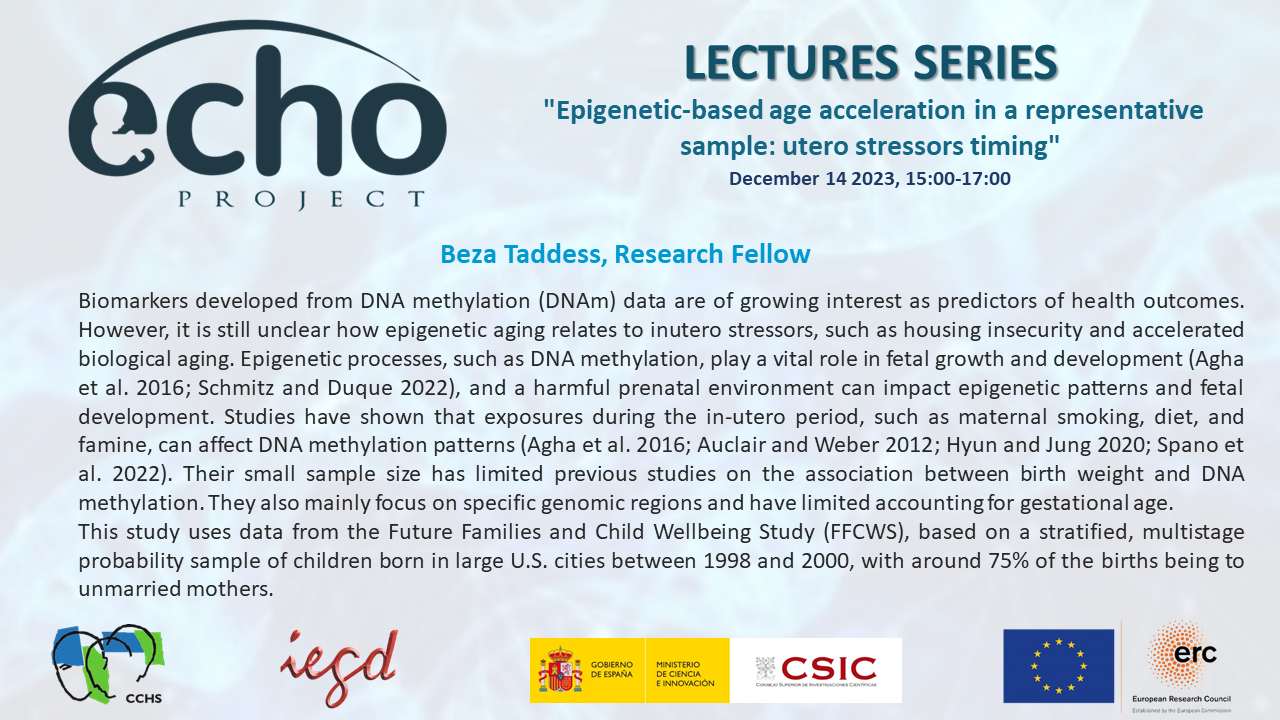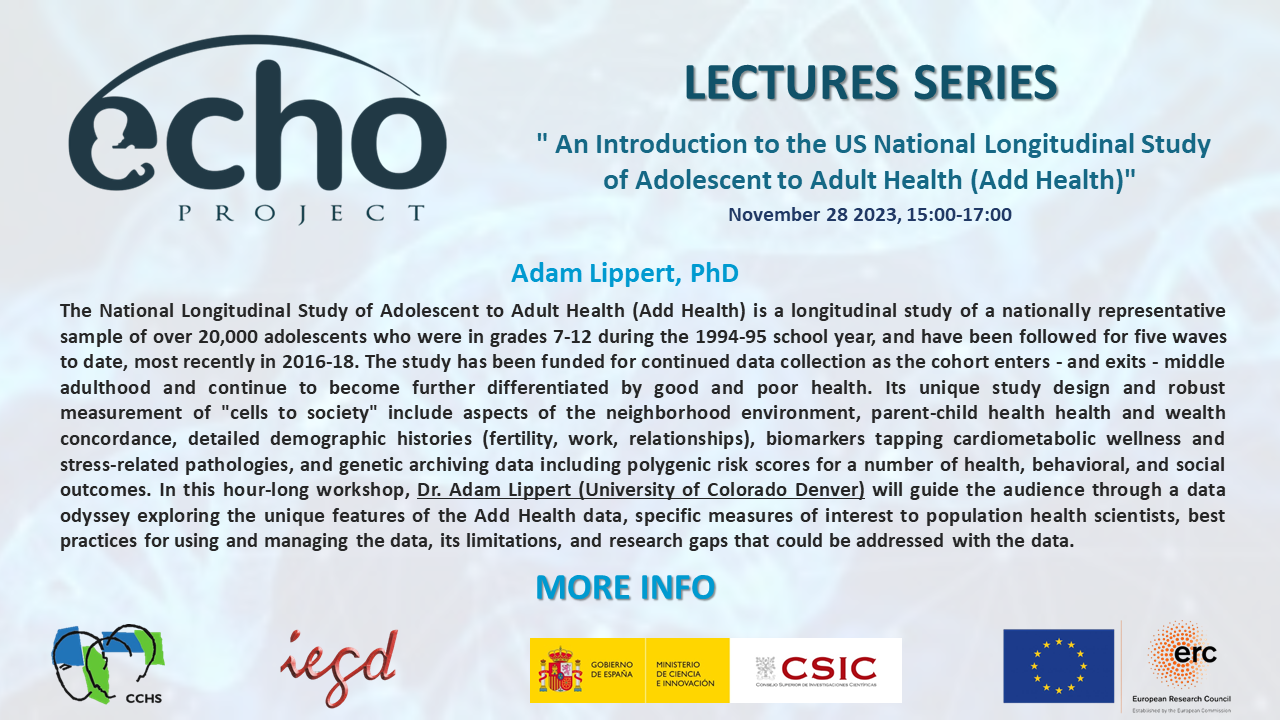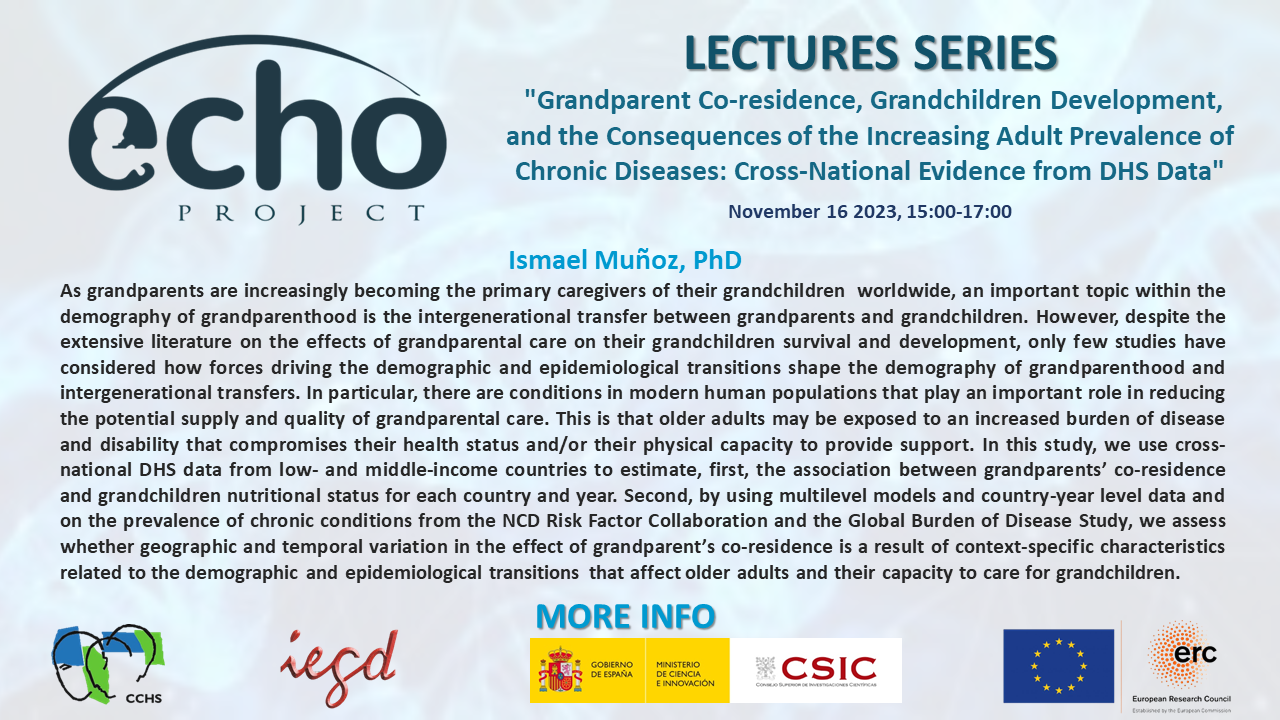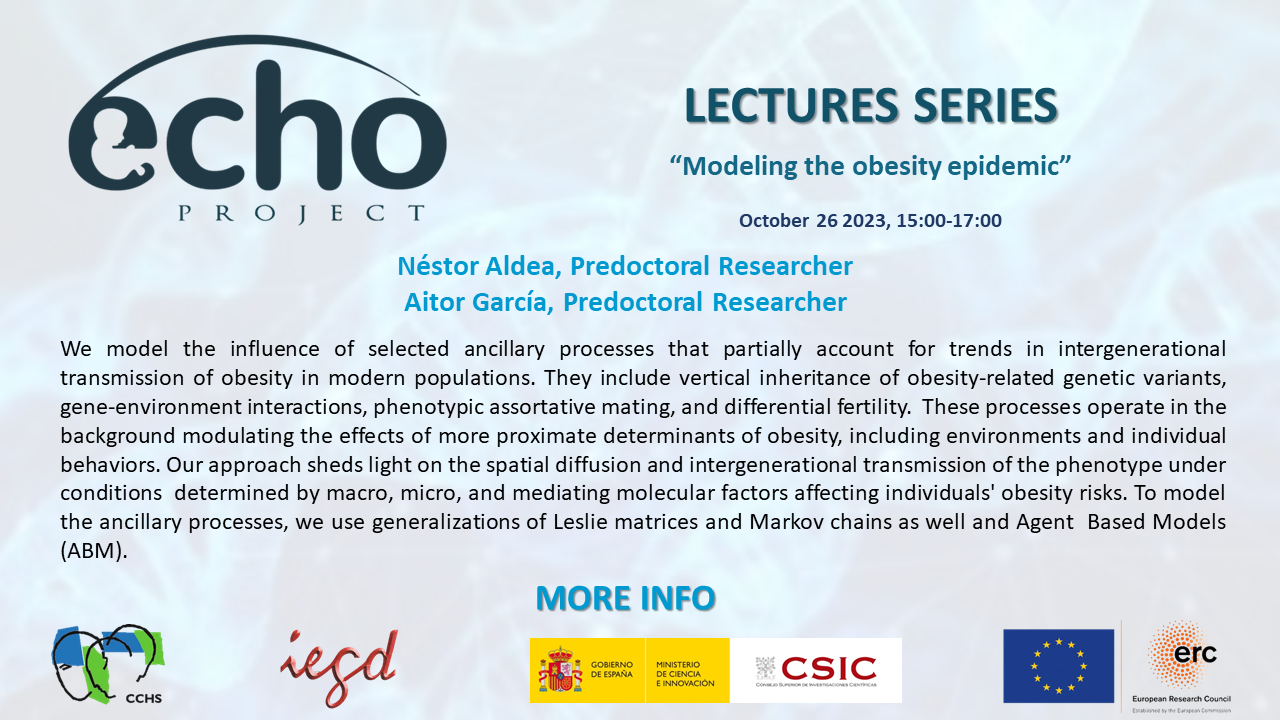Epigenetic-based age acceleration in a representative sample: utero stressors timing
Sala Manuel de Terán, IEGD-CCHS-CSIC, Madrid
December 14, 2023
15.00-17:00 CET
Biomarkers developed from DNA methylation (DNAm) data are of growing interest as predictors of health outcomes. However, it is still unclear how epigenetic aging relates to inutero
stressors, such as housing insecurity and accelerated biological aging. Epigenetic processes, such as DNA methylation, play a vital role in fetal growth and development (Agha et al. 2016; Schmitz and Duque 2022), and a harmful prenatal environment can impact epigenetic patterns and fetal development. Studies have shown that exposures during the in-utero period,
such as maternal smoking, diet, and famine, can affect DNA methylation patterns (Agha et al. 2016; Auclair and Weber 2012; Hyun and Jung 2020; Spano et al. 2022). Their small sample size has limited previous studies on the association between birth weight and DNA methylation. They also mainly focus on specific genomic regions and have limited accounting for gestational age.
This study uses data from the Future Families and Child Wellbeing Study (FFCWS), based on a stratified, multistage probability sample of children born in large U.S. cities between 1998 and 2000, with around 75% of the births being to unmarried mothers. Baseline interviews were conducted with mothers in the hospital soon after the child’s birth, and fathers were
interviewed either in the hospital or by phone. Follow-up interviews were conducted with both parents when the child was one, three, five, and nine years old. 2,667 mothers provided saliva
samples for biological assays of DNA methylation data approximately nine years after their child’s birth. Genetic information was obtained from saliva samples provided by the focal children and their biological mothers during in-home visits at the 9-year follow-up wave. Saliva samples were collected again from focal children during the 15-year follow-up wave. This data
includes variables generated from DNA methylation data from Illumina EPIC and 450K methylation arrays, such as DNAmAges generated from 13 epigenetic clocks, cell proportions derived from the DNA methylation data, and chronological age. Other variables indicate whether a DNA sample was available, if it passed quality control, if TL was measured, and if the TL
passed quality control. The central aim of the study is how does in-utero housing insecurity experienced by the mother during pregnancy predict epigenetic-based age acceleration at nine and age 15?
Beza Taddess, Princeton University
is a doctoral student in Sociology at Princeton. Her graduate work thus far has focused on the topics: (1) the stress-related consequences for Black and white women in multiply-segregated occupations; (2) the contributions of socioeconomic and genetic risks to cardiometabolic health at mid-life. The coursework she completed en route to her MA was concentrated in demography, health disparities, and quantitative methods.
Before joining the graduate program at Princeton, Beza led the communications team at the Colorado Children’s Campaign in Denver, Colorado. Her work entails writing policy concept papers, editing draft legislation, and leading the organization’s communications strategies. In collaboration with her team, noteworthy achievements in this role included passing Proposition EE, a ballot measure that will provide $2 billion over ten years to a universal preschool program, and the launch of The West Steps podcast, which has amassed over 10,000 listeners since 2019.
She joined the Children’s Campaign as part of the Public Interest Fellowship Program in 2015 after graduating with a degree in Sociology from Colorado College. She received her Master’s from the University of Colorado Denver in May 2021.
An Introduction to the US National Longitudinal Study of Adolescent to Adult Health (Add Health)
Sala Manuel de Terán, IEGD-CCHS-CSIC, Madrid
November 28, 2023
15.00-17:00 CET
The National Longitudinal Study of Adolescent to Adult Health (Add Health) is a longitudinal study of a nationally representative sample of over 20,000 adolescents who were in grades 7-12 during the 1994-95 school year, and have been followed for five waves to date, most recently in 2016-18. The study has been funded for continued data collection as the cohort enters – and exits – middle adulthood and continue to become further differentiated by good and poor health. Its unique study design and robust measurement of “cells to society” include aspects of the neighborhood environment, parent-child health health and wealth concordance, detailed demographic histories (fertility, work, relationships), biomarkers tapping cardiometabolic wellness and stress-related pathologies, and genetic archiving data including polygenic risk scores for a number of health, behavioral, and social outcomes. In this hour-long workshop, Dr. Adam Lippert (University of Colorado Denver) will guide the audience through a data odyssey exploring the unique features of the Add Health data, specific measures of interest to population health scientists, best practices for using and managing the data, its limitations, and research gaps that could be addressed with the data.
Dr. Adam Lippert, University of Colorado Denver
is Associate Professor of Sociology at the University of Colorado in Denver, Population Scientist with the Colorado Population Center, and visiting scientist with the ECHO project. He completed his Ph.D. in Demography and Sociology at the Pennsylvania State University (2013) and postdoctorate at the Harvard Center for Population and Development Studies (2015). His research examines how social contexts – neighborhoods, schools, and places of work – transmit health resources and risks over the life course.
Grandparent Co-residence, Grandchildren Development, and the Consequences of the Increasing Adult Prevalence of Chronic Diseases: Cross-National Evidence from DHS Data
Sala Manuel de Terán, IEGD-CCHS-CSIC, Madrid
November 16, 2023
15.00-17:00 CET
As grandparents are increasingly becoming the primary caregivers of their grandchildren worldwide, an important topic within the demography of grandparenthood is the intergenerational transfer between grandparents and grandchildren. However, despite the extensive literature on the effects of grandparental care on their grandchildren survival and development, only few studies have considered how forces driving the demographic and epidemiological transitions shape the demography of grandparenthood and intergenerational transfers. In particular, there are conditions in modern human populations that play an important role in reducing the potential supply and quality of grandparental care. This is that older adults may be exposed to an increased burden of disease and disability that compromises their health status and/or their physical capacity to provide support. In this study, we use cross-national DHS data from low- and middle-income countries to estimate, first, the association between grandparents’ co-residence and grandchildren nutritional status for each country and year. Second, by using multilevel models and country-year level data and on the prevalence of chronic conditions from the NCD Risk Factor Collaboration and the Global Burden of Disease Study, we assess whether geographic and temporal variation in the effect of grandparent’s co-residence is a result of context-specific characteristics related to the demographic and epidemiological transitions that affect older adults and their capacity to care for grandchildren.
Dr. Ismael Muñoz, IEGD-CSIC
is a Postdoctoral Researcher at The Institute of Economics, Geography and Demography at the Spanish National Research Council. He holds a PhD in Educational Theory and Policy and Comparative and International Education with a minor in Demography from Pennsylvania State University. His research projects aim to understand the causes and consequences of educational inequality, with particular focus on how inequities in educational experiences and attainment influence health outcomes over the life course. For this purpose, he employs a wide range of methodological designs, including demographic and quasi-experimental techniques applied to cross-national and close case studies. His work in these areas has been published in Demography, Social Science and Medicine: Mental Health, Education Policy Analysis Archives, and other academic journals and books.
The Madrid Longitudinal Historical Population Register: some results and possibilities
Sala Manuel de Terán, IEGD-CCHS-CSIC, Madrid
November 7, 2023
15.00-17:00 CET
Within this talk we will present the Madrid Longitudinal Historical Population Register, which started in 2005, explaining its contents and some results and research lines during the past years. Within these results, we will focus on one example: Did the 1920s economic depression accelerated the epidemiological transition? Evidence from early-childhood mortality in Madrid, 1915-1926
We test a provocative hypothesis: did the 1920s economic depression accelerated the decline of water and food-borne infectious diseases mortality because the rise of cost of life, especially the increase in the price of milk, which encouraged maternal breastfeeding?
This hypothesis is studied in the context of Madrid, which was characterized during this period by deep social and spatial inequalities affecting childhood mortality which, however, declined. Building on an exhaustive database (255898 births and 228417 deaths from 1913-1926), we linked death and birth certificates for 95% of the children born in Madrid who died before their second birthday.
Using Cox and Fine-Gray models, we compare the amplitude of the summer peak of mortality (all cause and cause-specific), before, during and after the economic depression, controlling for the fluctuations in milk prices. Results suggest that the economic difficulties reduced the use of (often spoiled) commercial milk and encouraged maternal breastfeeding.
Dr. Diego Ramiro-Fariñas, IEGD-CSIC
is the Director of the Institute of Economics, Geography and Demography and Full Professor of Demography at the Spanish National Research Council. He was Marie Curie Fellow at the Cambridge Group for the History of Population and Social Structure at the University of Cambridge (UK) from 1998 to 2000. From 2001 till 2017, Tenured Scientist at the Spanish National Research Council. From 2002-2013, Head of the Department of Demography and from 2013-2019 Head of the Department of Population Studies. From 2010-2012 and 2019-2020, Vice-Director at the Center for Human and Social Sciences, a large (>800 employees) Research Facility. From 2011-2017, elected President of the Iberian Association of Historical Demography . From 2011, Member of the International Advisory Board of the Historical Sample of the Netherlands. From 2012, Member of the Council of Advisors of Population Europe, the Network of Leading’s Demographic Research Centers in Europe. From 2011-2014 Member and, from 2014-2017, Chair of the Historical Demography Panel at IUSSP. From 2015, Secretary General and Treasurer of the European Society of Historical Demography, member of the Advisory Board of the LatinAmerican Mortality Database University of Wisconsin-Madison and member of the Editorial Board at Peter Lang Editors, Population, Family and Society series. From 2016, member of the Editorial Board at Demography and from 2018, member of the Editorial Board of Spatial Demography. From 2017-2022, Member of the Digital Demography panel at IUSSP. From 2022, Member of the Historical Demography Panel at IUSSP. From 2019, Council Member of the US Social Science History Association. He was PI and Coordinator of the ITN Marie Curie H2020 LONGPOP project 2016-2020, PI of the H2020-MSCA-IF-2017 Project SEU-FER 2018-2020 and Team Member of the H2020 ERC Advanced Grant ECHO, 2019-2025. From 2017, Research Scientist at CSIC, Director of the Institute of Economics, Geography and Demography from February 2019 and President of the European Society of Historical Demography from 2020-2022. From 2019, coordinator of the Demographic Challenges Network funded by the Ministry of Science and Innovation. From March 2020 till today member of the CSIC COVID-19 Commission and member of CSIC PTI+ Global Health, Neuroaging Digital Science and Mobility. Since 2021, coordinator of the Laboratory of Aging and Experimental Statistics (https://envejecimientoenred.csic.es). Since 2022, elected member of the Free Emeritus College of Spain (https://colegiodeemeritos.es/) and member of the ICTS Commission at CSIC. Since 2023, elected member of the Scientific Advisory Board of the Max Planck Institute for Demographic Research https://www.demogr.mpg.de/en. Since 2023, Full Professor of Demography at the Spanish National Research Council.
He has directed 10 doctoral theses, 9 cum laude, 7 with option to extraordinary Award and 3 Extraordinary Awards of the UCM. Director of 6 international fellowships. Marie Curie IF (2018-2020), Leonardo Da Vinci, Fulbright US Senior Researcher, Master and Back, In-Time 36 (2) and on average each year tutors 2 Erasmus mundus. He has been principal investigator or part of the research team of more than 70 R&D projects both national and international, is director of the graduate course and lecture series Demography Today of the FBBVA and evaluator of several national and international journals and institutions. His main lines of research and publications are related to the study of mortality, demographic analysis, spatial demography and the development of longitudinal studies and the use of BigData, including the environmental impact on health.
Modeling the obesity epidemic
Sala Manuel de Terán, IEGD-CCHS-CSIC, Madrid
October 26, 2023
15.00-17:00 CET
We model the influence of selected ancillary processes that partially account for trends in intergenerational transmission of obesity in modern populations. They include vertical inheritance of obesity-related genetic variants, gene-environment interactions, phenotypic assortative mating, and differential fertility. These processes operate in the background modulating the effects of more proximate determinants of obesity, including environments and individual behaviors. Our approach sheds light on the spatial diffusion and intergenerational transmission of the phenotype under conditions determined by macro, micro, and mediating molecular factors affecting individuals’ obesity risks. To model the ancillary processes, we use generalizations of Leslie matrices and Markov chains as well and Agent Based Models (ABM).
Alberto Palloni
holds a PhD from the University of Washington, Department of Sociology. Currently, he is a researcher at the Institute of Economy, Geography and Demography of the Spanish National Research Council (CSIC), where he is the Principal Investigator of the ERC Advanced Grant “ECHO” project, and S.H. Preston Emeritus Professor of Population, University of Wisconsin-Madison. Previously, he has been a Professor of Sociology and Demography in several US universities. He served on the PAA board of directors from 1996 to 1999, was vice president in 2004 and president in 2006. In 2019 he has been awarded with the 2019 IUSSP Laureate. He is known for his research contributions in the areas of health, morbidity and mortality, indirect techniques for demographic estimation, demographic models for HIV/AIDS, aging in developing countries in general and Latin American in particular, fertility and family demography and, more recently, the relation between early childhood health and adult health, mortality and social stratification.
Néstor Aldea and Aitor García
are both Predoctoral Researchers at ECHO-ERC project. They are currently undertaking their PhD dissertations on “Morbidity and mortality of migrants in Spain: the role of intergenerational transmission of health status” and on “Social Sciences” with special interest in the methodological implementation of Agent-Based Models for different population-level processes.





